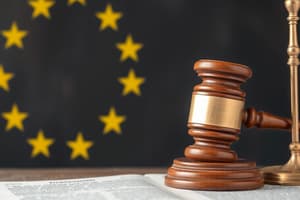Podcast
Questions and Answers
What does the principle of supremacy in EU law imply?
What does the principle of supremacy in EU law imply?
- National law prevails over EU law.
- EU law is superior to national law in case of conflict. (correct)
- EU law is secondary to national legislation.
- National laws can override EU regulations.
Which treaty is NOT considered primary law in the EU?
Which treaty is NOT considered primary law in the EU?
- Regulation on Member State Cooperation (correct)
- Treaty on the Functioning of the European Union (TFEU)
- Treaty of Lisbon
- Treaty on European Union (TEU)
How are regulations characterized in the context of EU law?
How are regulations characterized in the context of EU law?
- They are binding but only on certain member states.
- They are directly applicable in all member states. (correct)
- They are proposals that need approval from the Council.
- They require national implementation measures.
What role does the European Council play in EU institutions?
What role does the European Council play in EU institutions?
Which statement is true regarding the ordinary legislative procedure in the EU?
Which statement is true regarding the ordinary legislative procedure in the EU?
What type of legal act in EU law binds member states to achieve a specific result but allows flexibility in implementation?
What type of legal act in EU law binds member states to achieve a specific result but allows flexibility in implementation?
Which institution is responsible for interpreting EU law and ensuring its uniform application across member states?
Which institution is responsible for interpreting EU law and ensuring its uniform application across member states?
Which of the following statements about decisions in EU law is correct?
Which of the following statements about decisions in EU law is correct?
What does the Direct Effect principle allow individuals to do?
What does the Direct Effect principle allow individuals to do?
What is the primary purpose of Indirect Effect in EU law?
What is the primary purpose of Indirect Effect in EU law?
Which of the following areas does not fall under the realm of EU law?
Which of the following areas does not fall under the realm of EU law?
In which scenario are member states liable under State Liability?
In which scenario are member states liable under State Liability?
Which of the following challenges does EU law face regarding its application?
Which of the following challenges does EU law face regarding its application?
What impact do public opinions have on EU law?
What impact do public opinions have on EU law?
What is a primary objective of Competition Law within EU law?
What is a primary objective of Competition Law within EU law?
What is likely to influence the future of EU law?
What is likely to influence the future of EU law?
Flashcards
Supremacy of EU Law
Supremacy of EU Law
EU law takes precedence over national law when they conflict.
EU Treaties
EU Treaties
The core legal documents that establish the EU's goals, powers, and institutions.
EU Regulations
EU Regulations
Laws directly applicable in all EU member states, requiring no national implementation.
EU Directives
EU Directives
Signup and view all the flashcards
EU Decisions
EU Decisions
Signup and view all the flashcards
European Commission
European Commission
Signup and view all the flashcards
European Parliament
European Parliament
Signup and view all the flashcards
Court of Justice of the European Union (CJEU)
Court of Justice of the European Union (CJEU)
Signup and view all the flashcards
Direct Effect
Direct Effect
Signup and view all the flashcards
Indirect Effect
Indirect Effect
Signup and view all the flashcards
State Liability
State Liability
Signup and view all the flashcards
EU Competition Law
EU Competition Law
Signup and view all the flashcards
EU Fundamental Rights
EU Fundamental Rights
Signup and view all the flashcards
Balancing National Interests and EU Objectives
Balancing National Interests and EU Objectives
Signup and view all the flashcards
Ensuring Uniform Application of EU Law
Ensuring Uniform Application of EU Law
Signup and view all the flashcards
Adapting EU Law to Global Changes
Adapting EU Law to Global Changes
Signup and view all the flashcards
Study Notes
Overview of EU Law
- EU law is a complex system of rules and principles governing the functioning of the European Union, impacting individuals, businesses, and member states.
- EU law is based on the principle of supremacy, meaning EU law prevails over national law in case of conflict.
- EU law consists of primary and secondary law.
- Primary law includes the treaties establishing the EU (TEU and TFEU).
- Secondary law comprises legislation adopted by EU institutions (regulations, directives, and decisions).
Sources of EU Law
- Treaties are foundational legal instruments defining EU objectives, institutions, and powers (TEU and TFEU).
- Regulations are directly applicable legal acts binding in all member states, needing no national implementation.
- Directives bind member states concerning results, allowing national authorities to choose the form and method of implementation.
- Decisions address specific parties or states, binding only on those specified.
- Principles of EU law (e.g., supremacy) impact the validity and effect of EU law across legal fields.
Institutions of the EU
- European Commission proposes legislation, manages EU budgets, and represents the EU internationally.
- European Council defines EU's general political directions and priorities.
- European Parliament co-legislates with the Council, representing EU citizens.
- Court of Justice of the European Union (CJEU) interprets and ensures EU law application, maintaining uniformity across member states.
Procedures for EU Legislation
- Most EU legislation is adopted via the ordinary legislative procedure, involving co-decision between the European Parliament and the Council.
- This procedure ensures a democratic balance in the EU legislative process.
Key Concepts in EU Law
- Supremacy of EU law means EU law preempts conflicting national law within its jurisdiction.
- Direct effect allows individuals to invoke specific EU provisions directly before national courts.
- Indirect effect requires national courts to interpret national law in accordance with EU law.
- State liability holds member states accountable for damages caused by their authorities' breaches of EU law.
Practical applications of EU law across a variety of sectors and topics,
- Environmental Protection: EU regulations establish pollution, waste management, and industrial emission standards.
- Consumer Protection: EU acts safeguard consumers regarding products, services, and contracts.
- Free Movement of Goods: EU law regulates goods, services, capital, and people movement within the EU, aiding trade and integration but with regulations to manage potential impacts (e.g., market access quotas, health/safety standards).
- Fundamental Rights: EU law protects fundamental rights (freedom of expression, religion, assembly), enshrined in the Charter of Fundamental Rights.
- Competition Law: EU law regulates competition within the internal market to prevent anti-competitive practices and encourage fairness.
Key challenges facing EU law
- Balancing national interests with EU objectives.
- Ensuring uniform EU law application across diverse national legal systems.
- Handling public opinion on EU policies and regulations.
- Adapting to changes in global affairs.
Future of EU Law
- EU law's continued evolution and adaptation to new challenges and global trends is inevitable.
- Emerging technologies, globalization, and geopolitical shifts will shape EU law's future.
Studying That Suits You
Use AI to generate personalized quizzes and flashcards to suit your learning preferences.




